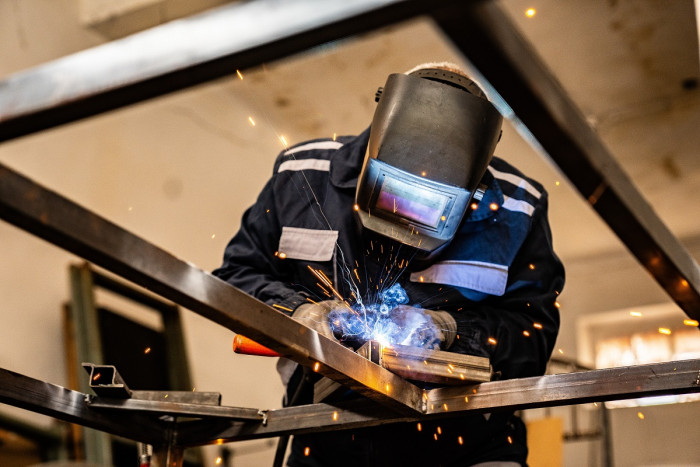Welder
Kaihonohono Maitai
Alternative titles for this job
Welders make, join and repair metal parts for machinery and equipment using welding techniques.
Pay
Welders usually earn
$60K-$65K per year
Boilermakers (specialised welders) can earn
$105K-$125K per year
Source: Seek, 2023
Job opportunities
Pay
Pay for welders varies depending on experience, qualifications, skills and if they specialise.
- Welders usually earn $60,000 to $65,000 a year.
- Fitters can earn $70,000 to $105,000 a year.
- Boilermakers, who are specialised welders, can earn $105,000 to $125,000 a year.
Sources: Seek, 2023.
- PAYE.net.nz website - use this calculator to convert pay and salary information
- Employment New Zealand website - information about minimum wage rates
(This information is a guide only. Find out more about the sources of our pay information)
What you will do
Welders may do some or all of the following:
- study plans and drawings
- cut and bend and fit steel or metal parts
- make jigs (of wood or metal) that hold parts in place for welding
- weld parts together
- repair and maintain equipment and machinery
- construct metal objects according to instructions.
Skills and knowledge
Welders need to have:
- knowledge of metals and their properties
- welding skills, including an understanding of different welding processes and equipment
- ability to interpret technical drawings
- knowledge of health and safety regulations.
Working conditions
Welders:
- usually work regular business hours but may have to do overtime and weekend work to meet deadlines
- work in industrial and engineering workshops, factories, and on building sites, boats or oil rigs
- may work in dirty and noisy conditions, and may be required to work at heights.
Entry requirements
There are no specific requirements to become a welder. However, many employers prefer to hire welders who have or are working towards a qualification.
To become a qualified welder you need to complete an apprenticeship and gain a New Zealand Certificate in Engineering - Fabrication (Level 4). For this certificate, you choose to specialise in light fabrication, heavy fabrication or steel construction.
Competenz oversees welding apprenticeships.
A driver licence may also be useful.
Secondary education
There are no specific secondary education requirements to become a welder. However, NCEA Level 2 maths, physics, English and technology are useful.
For Year 11 to 13 learners, trades academies and the STAR and Gateway programmes are good ways to gain relevant experience and skills.
These programmes may help you gain an apprenticeship, but do not reduce the amount of time it takes to complete it.
Personal requirements
Welders need to be:
- practical and adaptable
- able to make good judgments
- accurate, with an eye for detail
- responsible and safety-conscious
- good at basic maths.
Useful experience
Useful experience includes:
- welding experience
- other mechanical engineering or construction work
- work in an engineering workshop.
Physical requirements
Welders need:
- to be fairly strong, as there can be some heavy lifting involved
- to have good eyesight (with or without corrective lenses)
- steady hands.
Find out more about training
- Competenz
- 0800 526 1800 - info@competenz.org.nz - www.competenz.org.nz
What are the chances of getting a job?
Welders in high demand
Chances of getting a job as a welder are good because:
- many existing welders are nearing retirement age
- not enough people are being trained to meet the demand for workers
- trained welders are leaving New Zealand to work overseas for higher pay rates
- New Zealand manufacturers need welders to build machinery components for export.
Welders needed for construction boom
Welder and fitter-welder appear on Immigration New Zealand's construction and infrastructure skill shortage list.
Metal Fabricator, Pressure Welder, Welder, Fitter (General), Fitter and Turner, Fitter-Welder and Metal Machinist (First Class) will appear on Immigration New Zealand's Green List from March 2024.
This means the Government is actively encouraging these skilled workers from overseas to work in New Zealand.
According to the Census, 3,048 welders worked in New Zealand in 2018.
Welders work in a variety of industries
Welders can work for businesses in a wide range of industries, including:
- automotive engineering
- marine construction
- building and construction
- machinery and equipment manufacturing
- specialised craft and equipment making and repair.
Ten percent of welders are self-employed.
Sources
- Book, S, 'Manufacturing Bounces Back in September', NBR, 13 October 2016.
- Competenz website, accessed March 2017, (www.competenz.org.nz).
- Hartley, B, engineering tutor, Southern Institute of Technology, Careers New Zealand interview, March 2017.
- Immigration New Zealand, 'Construction and Infrastructure Skill Shortage List', 27 May 2019, (www.immigration.govt.nz).
- Immigration New Zealand, 'Changes to Immigration Settings Announced, '23 September 2023 (www.immigration.govt.nz).
- Stats NZ, '2018 Census Data', 2019.
(This information is a guide only. Find out more about the sources of our job opportunities information)
Progression and specialisations
Welders may progress to set up their own welding business, or move into management, training or education roles.
They may specialise as boilermakers who construct, install and repair steam boilers, furnaces and containers that hold gases and liquids.
Last updated 11 April 2025


